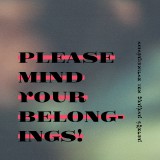I don't remember. I forgot and I was forgotten. I mean, I know that I know, but it just doesn't come to my mind. I'm not sure if it has happened, I may have seen it in my dream last night. No, no, I'm not throwing that away. No way! I need it to remember. It was from the day that...
The present research mounts from all the above phrases that I use frequently and by my personal involvement with the terms they deal with. Its content is divided into two main parts, which derive from two main theoretical directions: memory and objects. An attempt is made to decode the mechanism of memory, the way in which it works and the role that objects have in it. Any action and choice we make determines and relies on our memories. Any object and thing we use can interpret who we are. I wonder, how do we answer questions like what am I without my memories or how am I defined without my objects? These two themes unfold at parallel speeds to meet and intersect in the end.
The first section is dedicated to memory. Starting from its epistemology and its scientific definition, we move on to a more philosophical analysis. It refers to the way it is connected to perception, the body, recollections, and the senses. It is categorized into individual, collective, and historical memory and the temporal and spatial context in which it is located is analyzed. Mistaken memory, imagination are approached, and an example of the associative process is given, in order to arrive at the concept of forgetting and a-mnesia.
The second section is dedicated to objects. Starting from material culture, we move on to the distinction between symbolic and mnemonic objects. In particular, we focus on evocative objects and on the liminal stage they place us in. We analyze the relationship between possession and property of objects and the way in which they are classified. The concepts of collection and archive are then highlighted. Finally, it is presented a model of the practice of collection, the Wunderkammer, and a model of the practice of the archive, the Atlas.
